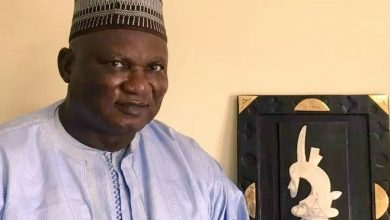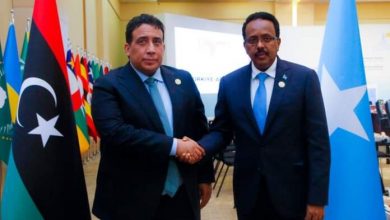U.S. Diplomat’s Resignation Signals Wider Exodus From State Department
An award-winning U.S. diplomat who was seen as a rising star at the State Department has issued a scathing resignation letter, accusing Secretary of State Rex Tillerson and the Donald Trump administration of undercutting the State Department and damaging America’s influence in the world.
An award-winning U.S. diplomat who was seen as a rising star at the State Department has issued a scathing resignation letter, accusing Secretary of State Rex Tillerson and the Donald Trump administration of undercutting the State Department and damaging America’s influence in the world.
Elizabeth Shackelford, who most recently served as a political officer based in Nairobi for the U.S. mission to Somalia, wrote to Tillerson that she reluctantly had decided to quit because the administration had abandoned human rights as a priority and shown disdain for the State Department’s diplomatic work, according to her letter, obtained by Foreign Policy.
“I have deep respect for the career Foreign and Civil Service staff who, despite the stinging disrespect this Administration has shown our profession, continue the struggle to keep our foreign policy on the positive trajectory necessary to avert global disaster in increasingly dangerous times,” Shackelford wrote in her Nov. 7 letter, which is published below. One phrase was redacted on Shackelford’s request.
“With each passing day, however, this task grows more futile, driving the Department’s experienced and talented staff away in ever greater numbers,” she wrote.
Her former colleagues said her departure — and the sentiments expressed in her letter — reflect a wider exodus of midcareer diplomats who have lost confidence in Tillerson’s management and the Trump administration’s approach toward diplomacy.
“She’s emblematic of what we’re losing across the board,” said one of Shackelford’s former State Department colleagues. “She is the best among us. We should not be losing the best among us. And that should concern people that we are,” the former colleague said.
In her letter, Shackelford said she was leaving with a “heavy heart” as she recognized the potential of the State Department’s mission. She said she was “shocked” when Tillerson appeared to cast doubt on the importance of human rights in remarks to department employees on May 3.
The State Department’s role in internal government debates also had “diminished,” she wrote, with the White House handing over authority to the Pentagon to shape the country’s foreign policy. Meanwhile, unfilled vacancies and proposed budget and staffing cuts had left the department adrift, with weakened influence inside the administration and on the ground, she wrote.
“The cost of this is visible every day in Mission Somalia, my current post, where State’s diplomatic influence, on the country and within our own interagency, is waning,” she wrote.
In the closing paragraph of her letter, Shackelford called on Tillerson “to stem the bleeding by showing leadership and a commitment to our people, our mission, and our mandate as the foreign policy arm of the United States.
“If you are unable to do so effectively within this Administration, I would humbly recommend you follow me out the door.”
Shackelford was singled out as an especially promising diplomat and was selected for future senior leadership roles, which a veteran foreign service officer said was unusual at her age.
“Let me underscore that Lizzy Shackelford was one of the most promising officers and an exceptional leader in the Foreign Service,” the senior official, who spoke on condition of anonymity, told FP. “An officer who makes it into the service and leaves because she was not supported means we must work harder to mentor, reform our system, and support outstanding officers like Lizzy.”
When asked about the criticisms in the letter, State Department spokesperson Heather Nauert said: “We are not able to comment on the career choices of each person at the Department.”
“However, I can say that the Secretary has made clear that his objective is to make the State Department more efficient, more effective, and for staff to have a much more rewarding and satisfying career,” she added.
Tillerson has faced a wave of criticism from lawmakers and former senior diplomats about what they say is the dismantling of the State Department amid a hemorrhaging of top talent, a hiring freeze, and plummeting morale. He has firmly rejected the criticism, insisting the media mischaracterizes the rate of those leaving the department and that his plan to “redesign” the State Department is employee-driven and prioritizes the staff’s well-being.
“What it’s done,” Tillerson said of the hiring freeze on Friday, “was just a little bit of a blunt instrument to have everyone be a little more disciplined about filling their positions.”
But even his harshest critics say much of the blame for the troubled state of the foreign service rests with the president, who has shown an impatience with diplomacy and has often sidelined Tillerson.
Shackelford’s sentiments also reflect a long-held but growing concern among diplomats and experts that U.S. policy is increasingly dominated and shaped by the military, particularly in Africa. The Pentagon has expanded its footprint and operations on the continent with additional funding while the State Department and USAID face steep budget cuts and a dearth of ambassadors or top appointees in Washington.
Linda Thomas-Greenfield, a retired career diplomat and former assistant secretary of state for African affairs, said the U.S. military has a vital role to play in Africa and elsewhere but said the pendulum was swinging too far away from diplomacy. “You can’t just do military. You have to have the complement of diplomatic and development working alongside the military colleagues,” she told FP.
Somalia reflects a balance that clearly favors the military, as the State Department lacks the manpower and resources of its Pentagon counterparts. In recent months, the U.S. military has expanded its role with hundreds of troops and more strikes against al-Shabab militants, while diplomatic efforts have ebbed following the departure of U.S. Ambassador to Somalia Stephen Schwartz in October.
The staff at the U.S. mission have repeatedly asked Washington for permission to meet Somali political leaders at Villa Somalia, the presidential residence, but the State Department has rejected the request on security grounds. U.S. military officers are able to meet Somali officials at the presidential palace, and other foreign diplomatic missions regularly visit the building for talks.
Friday was Shackelford’s last day as a foreign service officer after nearly eight years in the State Department.
Born and raised in Jackson, Mississippi, the 38-year-old Shackelford graduated first in her class at the University of Pittsburgh Law School. She worked at a law firm, then the consulting company Booz Allen Hamilton on foreign aid projects before joining the foreign service in 2010.
Shackelford distinguished herself in South Sudan for overseeing the evacuation of 1,000 Americans and other foreign nationals when violence erupted in Juba in December 2013. For her leadership skills and crisis planning in the evacuation effort, she received a department-wide Barbara M. Watson award for consular excellence.
During her stint in South Sudan, Shackelford worked to document and focus attention on human rights abuses, according to those she worked with and a personal statement she submitted as part of an employee evaluation. She cultivated contacts with South Sudanese civil society organizations and met with victims and witnesses of atrocities committed in the country’s conflict. Convinced that there could be no lasting peace without coming to terms with crimes committed on both sides, she co-wrote a dissenting cable backed by some of her fellow diplomats making that argument.
“Her view was if we don’t deal with accountability now, whatever peace that’s achieved is going to be temporary,” said another former colleague, who worked with her in Juba. “She made it her mission to get human rights material out the door.”
Shackelford is not alone in accusing the Trump administration of backsliding on America’s support for human rights and democracy over the past ten months. Republican Sen. John McCain, chairman of the Senate Armed Services Committee, and Sen. Ben Cardin, the ranking Democrat on the Senate Foreign Relations Committee, wrote a letter to the president on Friday accusing his administration of failing to assert America’s commitment to human rights.
The lawmakers wrote that “for much of the past year, our national voice on international human rights issues has been largely silent.”
But Deputy Secretary of State John Sullivan told the House Foreign Affairs Committee on Thursday that in a recent tour of Africa, he repeatedly raised human rights concerns with governments in Ethiopia and Sudan, saying it was a crucial element in the fight against terrorist threats.
“The United States continues to emphasize respect for human rights as a fundamental part of our counterterrorism strategy,” Sullivan told lawmakers.
Six months ago, when Shackelford began considering leaving the foreign service, her mentors and colleagues encouraged her to stay the course, telling her she had a promising career ahead of her and that the difficulties would pass, she told FP.
But in a sign of plunging morale in the foreign service, when she spoke to those same colleagues two months ago about resigning, she got a much different response.
“It had completely changed to a person,” she said. “Nobody tried to talk me out of it. Everybody said, ‘Yep, I get it.’”





